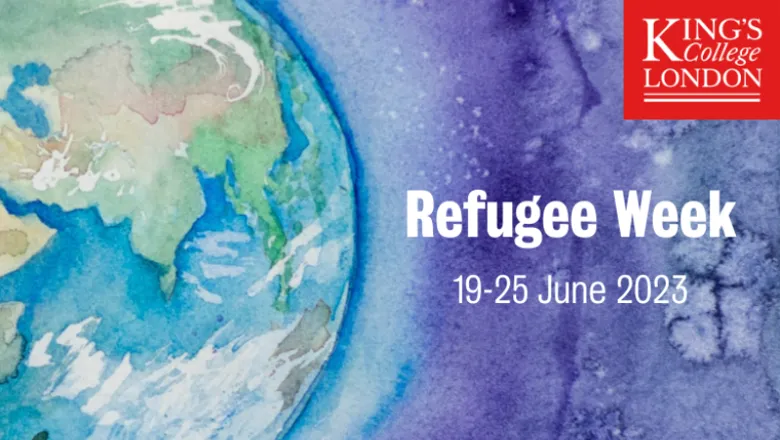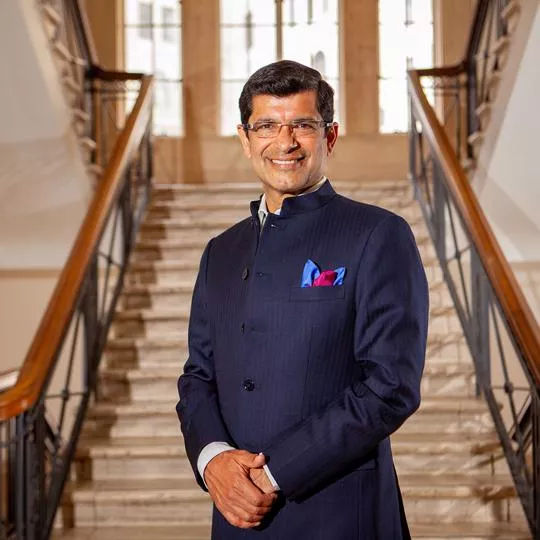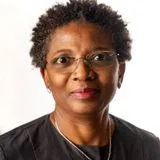Forced displacement impacts access to education and research for far too many. At King’s, we believe that universities have unique resources to support forced migrants to continue their academic journeys. I am proud of the work that King’s has been leading on higher education-led pathways through university sponsorship and look forward developing our Sanctuary Programme as we work with university partners that share our ambitions, alongside our local and global communities.
Professor Shitij Kapur, President & Principal of King’s College London
19 June 2023
King's puts 'Compassion into Action' for Refugee Week 2023
This week (19-25 June) marks Refugee Week, for which the theme is ‘Compassion into Action’. As a university, King’s strives to ensure individuals affected by forced displacement can rebuild their lives and fulfil their potential.

Continuing conflict in regions across the globe means forced displacement remains one of the world’s most pressing challenges. More than 110 million people around the world have been forced to leave their homes due to persecution, violence, human rights violations, and increasingly due to environmental degradation.
Refugee Week is a celebration of the contributions, creativity and resilience of refugees and people seeking sanctuary, held every year around the United Nation’s World Refugee Day on the 20 June. This year’s theme, ‘Compassion for Action’, marks an opportunity to highlight how universities can demonstrate compassion.
Forced displacement particularly impacts young people and disrupts their education. Just 6% of refugees have access to higher education, compared to the global average of 40% among non-refugees. In 2019, the UNHCR (United Nations High Commissioner for Refugees) set the goal to increase enrolment of refugees in higher education from 6% to 15% by 2030.
The number of academics in need of sanctuary also continues to grow, with the Council for At-Risk Academics (Cara) reporting that applications to their Fellowship Programme increased from 120 in 2020/21 to over 1,100 in 2021/22. This surge in applications for support has continued into 2023.
King’s, with its broad community of internationally diverse scholars, researchers, policy shapers, volunteers and entrepreneurs, is committed to applying knowledge and expertise and to continuing to learn from affected communities, with the aim of improving the lives of forced migrants and increasing their access to higher education.
Migration research at King’s
King’s academics lead crucial research across a range of diverse and relevant topics including refugee mental health, safe and legal pathways, and the intersection of climate change and forced migration, as well as evidence-based studies on statelessness, border violence and inclusive integration.
The Migration Research Group (MRG), for example, based in the Department of War Studies, is an interdisciplinary group of staff and students with an interest in the study of migration. Set up in the wake of the misnamed “European refugee crisis”, the MRG seeks to develop a better understanding of, and change the often negative narrative surrounding, migration in Europe and beyond. For instance, rather than starting with borders and seeing migration as a ‘problem’, the focus is shifted by studying the effects of migration management policies and the lived experiences of people on the move. The MRG’s projects are co-created with affected communities and include research, training, advocacy, policy advice and artistic practice.
There is also the Refugee Mental Health & Place Network, a growing network of researchers and community organisations who are exploring post-migration factors and refugee mental health. They seek to inform health and social policy to help improve mental health outcomes for refugees and asylum seekers. Through the network, researchers at King’s ESRC Centre for Society and Mental Health have helped to develop the Mental Health and Psychosocial Support (MHPSS) Directory – a broad and detailed list of organisations that provide mental health and social support services to migrants, refugees and asylum seekers in London.
The findings, outcomes and recommendations from King’s research have proven instrumental for informing governmental policy, as well as university-led initiatives such as the King’s Sanctuary Programme.
King’s Sanctuary Programme
Founded in 2015, the King's Sanctuary Programme is a sector-leading initiative that brings together education, research and impact to tackle the pressing global challenge of forced displacement. Over the past eight years, King’s has harnessed its expertise in education and remote learning, as well as research and existing partnerships, to initiate and lead on projects that create positive opportunities for forcibly displaced students and academics.
Working to ensure education remains a right for all, the Programme offers individuals affected by conflict and displacement unrivalled opportunities to rebuild their lives and fulfil their potential. At its heart, the Sanctuary Programme represents King’s commitment to serving society.
Everything we do at King’s is driven by service to society. This is especially true of our Sanctuary Programme which creates positive opportunities for forcibly displaced people. We achieve this by translating research into tangible social and political change, widening access to higher education for forcibly displaced students and academics, and harnessing the power of education to support students to make their own meaningful contributions to making the world a better place.
Professor ‘Funmi Olonisakin, Vice President (International, Engagement & Service)
Widening access to higher education
Through a range of groundbreaking initiatives and bespoke scholarships, King’s staff have supported sanctuary seekers to thrive in higher education, educated thousands of displaced people through blended bridging programmes and bespoke contextualised online university courses, and enriched the UK community sponsorship scheme by developing an education-led pathway for forcefully displaced students and academics.
Since February 2022, when Russia invaded Ukraine, King’s has been one of a number of universities across the UK that has contributed to the support effort and created initiatives specifically for individuals impacted by the war to help them continue with their education or research.
Taking a lead, King’s worked in partnership to develop the University Sponsorship Model with Citizens UK, Ukrainian Sponsorship Pathway UK (USPUK), Open University, Newcastle University and the University of Leicester. The University Sponsorship Model enables HE institutions to implement the Government’s Homes for Ukraine scheme and help students and academics to find safety in the UK and continue their studies and research.
University sponsorship offers displaced students and academics a safe and legal pathway as well as access to Higher Education. The broader ambition of this work is to create a model and policy that can be scaled, replicated and adapted to support forcibly displaced students and academics from across the world.
Thanks to a £3 million donation from XTX Markets’ Academic Sanctuaries Fund, the University Sponsorship Model includes a unique scholarship programme through which studentships and fellowships are distributed across all partner universities. It has also enabled the launch of the Sanctuary Hub, which brings together migration researchers with civil society, government, business and sanctuary seekers to develop research that positively shapes (inter)national migration policy and practice.
Refugee Week and the UN’s World Refugee Day provide an opportunity to shine a light on the impactful work at King’s and how we strive to put ‘Compassion into Action’. This week is also an opportunity to reflect on the crucial role of the wider HE sector and how we continue to develop safe and legal pathways for displaced students and academics to continue their studies, research and work in the future.
Dr Leonie Ansems de Vries, Reader in International Politics, Director of the King's Sanctuary Programme and Chair of the Migration Research Group
Take part in Refugee Week 2023
To mark Refugee Week, King's is hosting a range of events to highlight and celebrate the many ways that our community responds to the global issue of forced displacement and works to create opportunities for forcefully displaced people. Activities at King’s will include a day of workshops for students and staff, performances, exhibitions, and events involving leading academics, people with lived experience and charities that support refugees and forced migrants.
Sanctuary Workshops (Thursday 22 June)
For Refugee Week 2023, the King’s Sanctuary Team are running a day of in-person workshops on various topics related to the global issue of forced displacement and access to higher education for forcibly displaced students and academics. By taking part, you will learn more about forced displacement and discover ways they can support the many people impacted by this global issue.
For further information, please see the Sanctuary Workshops event page and view the Sanctuary Workshops outline.



